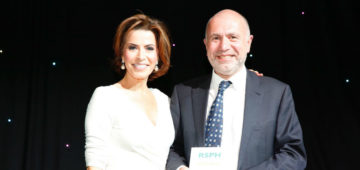- 15 January 2020
RSPH is urging the Joint Committee on Vaccinations and Immunisation (JCVI) to make a swift decision on extending the HPV vaccination to all boys. A subgroup of the Committee which meets on Monday 22 September is currently considering the cost-effectiveness of rolling out the vaccine and is expected to focus initially on offering it to Men who have Sex with Men (MSM).
Extension of the vaccine to boys is one of several recommendations the RSPH is calling for in a newly published paper on HPV. Other recommendations include:
- Explore piloting the HPV vaccine to MSM in a range of settings, including gyms
- Speed up decision-making on offering the HPV vaccine to all 12-13 year old boys at school. RSPH is concerned that a decision won’t be reached until the end of 2016
- Provide males with the same protection against genital warts that is currently offered to girls by offering Gardasil
- Ensure that the cost per dosage for the vaccine takes into account the lower cost per QALY (Quality Adjusted Life Years) for boys
Shirley Cramer, CEO of RSPH welcomed any proposed move to extend the vaccination to MSM, but reiterated that providing the vaccine to boys in schools would be a more straightforward approach. “Given the strong association between HPV and oral, anal and penile cancers, and the prevention of genital warts, it makes absolute sense that the vaccine should be extended to males. HPV doesn’t discriminate between the sexes, and we would urge the JCVI to ensure that the vaccine is offered in schools to boys.”
“While moves to extend the vaccination to MSM (who currently do not receive protection through herd immunity), is a step forward, we should be introducing the vaccination before the age of sexual debut, and the school setting provides an ideal environment to ensure boys complete both doses. If the vaccine is not offered within a school setting, and is received after the age of 14, then an additional dose of the vaccine is required, and there may be a danger of drop out in completing all 3 doses required to guarantee HPV immunity.”
To minimise vaccine drop out, the RSPH is calling for a range of settings to be used to target MSM. While the HPV vaccination could be offered as part of standard screening in GUM clinics, by this stage an individual may be presenting with an STI and could well have been exposed to a strain of HPV.
Given that 3 doses of the vaccine will be required for boys aged 14+, there is a very real risk that individuals will not complete all doses. To militate against this, RSPH is calling for the HPV vaccine to be piloted in a range of settings, in which individuals are likely to return to. For example, pharmacies, gyms or Universities could all be used effectively to ensure that MSM are accessed in a timely manner with the vaccine.
In addition to exploring the setting in which a vaccination is offered, research on hepatitis B suggests that offering incentives, such as small amounts of cash and supermarket vouchers can help encourage individuals to complete the full dose of treatment.
A range of incentives appropriate for the setting could be introduced. For example, those accessing the vaccine through a gym could receive a free period of gym membership as an incentive to complete all doses; or students could be offered food vouchers to be used within the university.



